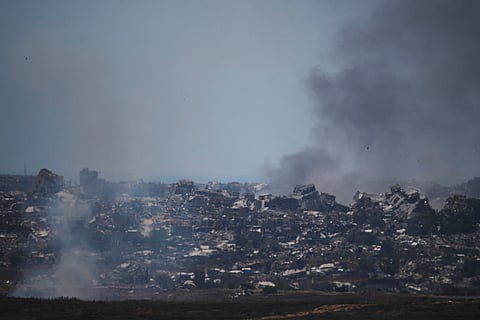

At least 60 Palestinains, including more than six security officers guarding the "minimal" humanitarian aid that had entered Gaza from being looted were killed by Israeli forces on Friday in airstrikes described by the Gaza Government Media Office as “part of a plan to engineer starvation and disrupt humanitarian relief.”
“Several more martyrs remain at the scene of the massacre, unreachable due to ongoing shelling and continuous gunfire from warplanes in the area,” the GMO said in a statement.
“The deliberate targeting of these personnel, who were carrying out purely humanitarian tasks to secure two aid trucks carrying essential medicines and medical supplies for the health sector, and ensuring their safe arrival to hospitals in affected areas, constitutes a full-fledged war crime,” the statement said.
“It has become evident that the Israeli military is methodically enabling the looting of humanitarian aid and medical shipments, and ensuring their non-arrival to rightful beneficiaries by targeting those working to organise and secure safe delivery routes,” it added.
The killed also include 10 people in the southern city of Khan Younis, four in the central town of Deir al-Balah and nine in the Jabaliya refugee camp in the north, according to the Nasser, Al-Aqsa and Al-Ahli hospitals where the bodies were brought.
The strikes that lasted into Friday morning came a day after Israeli tanks and drones attacked a hospital in northern Gaza, igniting fires and causing extensive damage, Palestinian hospital officials said on Thursday. Videos taken by a health official at Al-Awda Hospital show walls blown away and thick black smoke billowing from wreckage.
Meanwhile, 15 World Food Programme trucks were looted in Southern Gaza while en route to WFP-supported bakeries.
Nearly 90 trucks of aid, including flour, food, medical equipment and drugs entered Gaza after Israel allowed "minimal" humanitarian assistance into the territory after a three-month-long blockade that has pushed the entire population into a famine-like situation. The trucks came in through the Kerem Shalom crossing.
But U.N. agencies say the amount is woefully insufficient, compared with around 600 trucks a day that entered during a recent ceasefire and that are necessary to meet basic needs. U.N. agencies say Israeli military restrictions make it difficult to retrieve and distribute the aid. As a result, little of it has so far reached those in need.
U.N. Secretary-General Antonio Guterres said Friday that Israel had so far authorized what "amounts to a teaspoon of aid when a flood of assistance is required," with no supplies at all reaching northern Gaza.
Echoing the UN's statement that the meagre aid is just "a drop in the ocean," the International Federation of Red Cross and Red Crescent Societies (IFRC) said that Gaza needs some 1,000 to 1,200 trucks a day to address the “immense” needs of the population.
“The president of the Palestinian Red Crescent today said that a couple of trucks entering is an invitation for killing. People are desperate – we need much more humanitarian aid, we need food, we need water, we need commercial items, we need medicines, formula for babies,” IFRC spokesperson Tommaso Della Longa told Al Jazeera.
He stressed that a lack of healthcare is a huge cause of “silent death” in Gaza, as people with chronic conditions, such as cancer or kidney disease, cannot access treatments like chemotherapy and dialysis because multiple hospitals and other healthcare facilities have been shitting down due to Israel's continues attacks. Israel's blockade of humanitarian aid, including medicines, has also made treatment impossible for those in need.
"This is simply unacceptable... Thinking about this [happening] in 2025 is shocking," he said.
On Friday dozens of people crowded a charity kitchen in Khan Younis, holding empty pots and plastic containers in the air in hopes of receiving a share of lentil soup.
Halima Abu Amra, a displaced woman from Rafah, said she had been struggling to feed a daughter injured in the fighting. She said she had been collecting discarded bread from the streets, washing and soaking it so her daughter can eat, while her younger children get by on soup.
“We want this war to end in any way," she said. “My family is dying slowly.”
UN's humanitarian chief Tom Fletcher had on Tuesday said that over 14,000 children could die in Gaza in the next 48 hours if sufficient aid did not reach them in time.
Speaking to BBC Radio 4’s Today programme, Fletcher remarked that the aid that entered Gaza after Israel's recent announcement was a “drop in the ocean” and totally inadequate for the population’s needs.
Calling the figure "utterly chilling," Fletcher told the BBC that he "wants to save as many as these 14,000 babies as we can in the next 48 hours.”
Gaza’s Government Media Office (GMO) had earlier this month said that nearly 2,90,000 children in Gaza are on the brink of death due to Israel's blockade of humanitarian aid.
“At a time when 1.1 million children daily lack the minimum nutritional requirements for survival, this crime is being perpetrated by the ‘Israeli’ occupation using starvation as a weapon, amid shameful international silence,” the GMO had said in a statement.
More than 57 Palestinians have so far starved to death in Gaza, causing international outrage against Israel's alleged weaponisation of starvation, which amounts to a war crime.